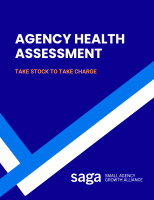Public relations and marketing agency owners often find themselves grappling with questions about how to stand out, attract clients, and achieve long-term success.
When you get started, you generally work with people you already know. It is less about a well-defined targeting plan and more about building revenue to pay the bills – including yourself!
Once the low-hanging fruit lies in the rearview mirror, it’s time to start thinking about a more thoughtful business development strategy.
It can be tempting to position yourself as a “full-service” agency because you fear restricting opportunity and slowing your growth.
The reality is that focus will help you to grow faster and smarter.
Why Focus Matters
Focus is the cornerstone of a thriving agency.
It streamlines your efforts and makes your sales and marketing initiatives more effective. It enables you to deliver superior results to your clients because you and your team get better and better at understanding their needs.
That increased knowledge also enhances your reputation and improves profitability because you spend less time figuring things out and more time getting things done. When you concentrate on what you know, you avoid the constant need to reinvent the wheel. Specialization also simplifies talent recruitment, making it more sustainable in the long run.
The bottom line is that focus empowers you to work smarter, not harder.
The Full-Service Fallacy
It’s easy to fall into the trap of wanting to be a full-service agency, offering a wide array of services to cater to every client’s needs. This notion, however, is often impractical for smaller agencies. True full-service agencies, akin to industry giants, can provide a diverse range of services because they operate at a massive scale. In contrast, small to mid-sized agencies may struggle to excel across all areas.
When agencies attempt to be everything to everyone, they risk diluting their expertise, making it challenging to achieve desirable outcomes for clients. Teams become spread thin, and knowledge gaps emerge. This can become particularly evident when clients require specialized services to succeed and you limp along to check the box without standing out.
Specialization, on the other hand, is a key driver of success. Clients seek agencies with specific expertise relevant to their needs. These focused agencies can command higher rates and build redundancy, mitigating the risk of relying too heavily on individual experts. By focusing on a niche, you stand out as an authority in that domain, attracting clients who value your specialized knowledge.
Finding Focus Vs. Niche-ing Down
While many industry discussions revolve around the concept of niche-ing down, I suggest a more flexible approach: finding focus. Rather than pigeonholing your agency into a specific industry, consider various criteria for specialization. These criteria can encompass geography, client size, primary contact within client organizations, and more.
The advantage of finding focus over niche-ing down is the versatility it offers. You’re not limited to one single criterion and can choose what works best for your agency and your target clients. This approach enables you to differentiate your agency without feeling like you boxed yourself into a too-narrow niche.
Start with What You Know
Defining your focus starts with a deep dive into your current and recent clients. Take the time to categorize them as good fits, bad fits, or somewhere in between. Examine your experiences with each client, considering factors like profitability and team satisfaction. This process will help you uncover commonalities that will form the basis of your ideal client profile.
Take all of your clients from the past three years and make a detailed list of as many characteristics of each that you can. Then separate that list into the clients you want to have more of, as well as those that you want to avoid.
Now you have a basis for building a clear ideal client definition.
Defining Your Ideal Client
Creating an ideal client profile is a crucial step in finding focus. It’s not merely a checklist of criteria but a clear picture that guides your agency toward the right clients and away from problematic ones. Your ideal client profile should include not only green lights to pursue but also red flags to avoid.
Be realistic yet aspirational in your ideal client definition. While it’s tempting to aim for Fortune 100 clients, remember that even smaller clients can yield significant profits and opportunities. Striking a balance between realism and idealism is key to building a thriving agency.
That’s why it is so important to look at your own experience and understand where your success for clients and profitability has come from. While you might find success in targeting an entirely new sector with new services, you are more likely to see progress by remaining true to your team’s existing expertise and the proven results you have produced.
Don’t Fear Competition
Many agency owners spend an excessive amount of time worrying about standing out in a crowded market. They believe they need to be utterly unique to attract clients.
That leads to a lot of time spent on competitors’ websites to try to find ways to describe themselves differently and offer a different suite of services.
However, most clients aren’t seeking groundbreaking innovation. They’re looking for a good fit. Speak your prospects’ language, communicate clearly, and avoid overwhelming them with unnecessary detail. Clarity should be your guiding principle.
Even if you offer the exact same services as another agency and describe those services in the same way, prospects will be able to select between you because of how you relate to them in conversations and the ideas and solutions that you offer to them for their specific challenges.
Spend time talking about yourself and your team’s expertise rather than obsessing about what your perceived competitors might be up to. There’s plenty of business out there to be won.
Crafting Your Elevator Pitch
Your elevator pitch is your basic positioning statement. It’s the tip of the spear in your marketing efforts. It is something you should be able to deliver to a stranger during a brief ride on an elevator – hence the name.
In just a couple of sentences it should succinctly and clearly convey who you are, who your ideal clients are, and the value that you offer.
When a prospect hears these sentences, they should be able to easily identify if they are likely to be a fit or not. The “or not” is just as important because it helps to ensure you spend your time as productively as possible. Almost every owner I know laments that they don’t have enough time for business development so there is no point wasting it on bad fits.
Just as important, these well-honed sentences enable others in your network to more easily think of people that they might refer you and your agency to. If I tell someone that I offer PR services, it is hard for them to quickly come up with potential prospects. If I tell them that I provide PR services for midsized biotech companies that are making plans to become publicly traded, it is much easier for them to scan their mental Rolodexes to see if they have a match.
Consistency is key—ensure every member of your team can deliver the same pitch effectively. A consistent message strengthens your brand image and makes it easier for your network to refer clients to you.
Conclusion
As you develop a Build to Own agency, finding focus is the compass that guides you toward success.
Growth for the sake of growth will leave you struggling and miserable. Finding the right clients that enable you to produce outstanding results and generate consistent profits will help to ensure that your agency works for you and gives you what you want from the business.
With focused positioning and a well-defined ideal client profile, your agency can carve out its own space and achieve enduring success.










